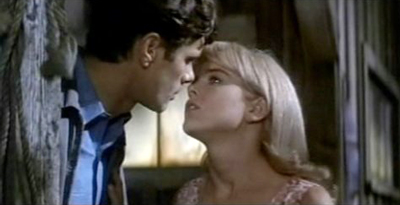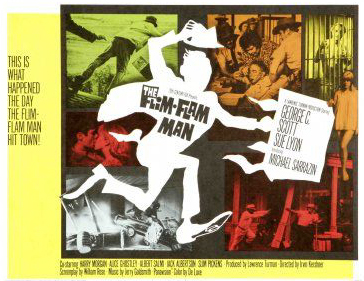
 |
|
|
|
The Flim-Flam Man is a very likeable comic tale about "short con" swindlers wending their way through the South. It's much less cynical a treatment of the subject than Stephen Frears' later The Grifters, which contains a flashback about a legendary flimflam specialist. Peter Bogdanovich's Paper Moon is about a lovable crooked Bible salesman, and George Roy Hill's sugarcoated The Sting presents its "long-con" specialists as folk heroes. Both pictures reach back to the doubtful innocence of the Depression. That's where we think we are at the outset of Flim-Flam, until a new 1967 police cruiser rolls into view. The Flim-Flam Man is the other film produced by Lawrence Turman, the year he broke through with The Graduate. It stands quite comfortably between the Old Hollywood and the New. The screenplay is by William Rose, the writer of the wild chase comedies It's a Mad, Mad, Mad, Mad World and The Russians are Coming. The Flim-Flam Man has its share of madcap car chases, but its director is the talented Irvin Kershner, then noted for his sensitive work with male stars. This show sees the debut of Michael Sarrazin, playing opposite the notorious scene-stealer George C. Scott. Kershner brings out the best of both actors. 
Shifty Mordecai Jones, the shameless "Flim-Flam Man" (Scott), hooks up with AWOL draftee Curley (Sarrazin). Since both are avoiding the police, Mordecai talks the young fugitive into serving as his shill for a series of con games aimed at greedy, gullible locals. Although the old and unrepentant Jones promises Curley that they'll cheat only the cheaters, his first act is to steal a red convertible belonging to Bonnie Lee Packard (Sue Lyon). When the car is destroyed Curley contacts Bonnie Lee and vows to make good the loss. He and Jones proceed with a number of con games that do indeed prove that plenty of ignorant, devious suckers are out there to be taken advantage of. Mordecai wants to head for Atlanta and more complicated "long-con" swindles, but Bonnie Lee encourages Curley to give himself up before things get too far out of hand. Unfortunately, Sheriff Slade of Cape Fear County (Harry Morgan) catches both flimflammers as they sleep. How can Curley save Mordecai, who will almost certainly go to prison for life? 20th-Fox must not have had enough confidence in this winning confidence-game story, for they sold The Flim-Flam Man as a madcap chase movie, complete with "Wham!" and "Bam!" graphics on the poster and trailers, just like the current TV hit Batman. And in the first half-hour the movie delivers an elaborate car chase sequence, with silent movie-style sight gags but also real fender-benders, and the wholesale destruction of buildings, courtesy of stunt director Yakima Canutt. What seems more impressive now is the careful handling of the uneasy Mordecai-Curley partnership. The young soldier can't return to his farm without being arrested, and an adventure with Mordecai offers a definite learning experience. Curley is soon aiding the swindler in fleecing rubes with the oldest card games around. Mordecai knows where the money is and goes straight for it, whether selling stolen rotgut moonshine liquor as bonded scotch or bamboozling bored store owners with get rich quick schemes. The two make an amusing pair of operators. Their best con is a "lost wallet" routine that victimizes a dishonest tobacco planter (Slim Pickens). As dumb as the trick is, we can see it working as well now as it did 100 years ago. 
Director Kershner steers the material in an interesting direction as we grow more attached to the characters. After the silly car chase the madcap elements thin out somewhat. Mordecai refuses to worry about the future -- he knows all too well that he's destined for the "gray stone hotel" -- but we worry for Curley, whose hopes of returning to his beloved farm (perhaps with Bonnie Lee) are growing dim. Instead of being sent to Vietnam, he'll most likely end up behind bars for ten years. Kirshner doesn't go the rebel route and blame the system for Curley's problems: Bonnie Lee's father even swears to help him. And we respond positively to Curley's refusal to abandon Mordecai. The old coot is a menace to the public, yet we get a twinkle in our eye knowing he's out there somewhere, a nonconformist rogue living by his wits. The film's strongest image is a guy in his long johns, running from the police with his oversized suitcase of disguises and card games. Under Irvin Kershner's direction, George C. Scott is positively subdued -- no bellowing or grandstanding here. Michael Sarrazin makes an auspicious debut. He'd play thoughtful loners in a number of memorable pictures during the 1970s. Sue Lyon's role is somewhat abbreviated yet respectable -- she's a thoughtful young woman, not a Southern flirt. Harry Morgan carries the bulk of the clowning as the puffed-up sheriff, but he's under control as well. His cigar-chomping Slade is a definite precursor to the Sheriffs J.W. Pepper and Buford T. Justice of the 1970s. The Flim-Flam Man got a lot of theater play in 1967 and 1968. I must have seen it four times on various double bills. Audiences loved it -- I remember the ending being applauded once or twice -- but It was soon forgotten, possibly because it was eclipsed by another road picture about a crime spree, the higher-profile Bonnie & Clyde. 
Twilight Time's DVD of The Flim-Flam Man is a snappy enhanced transfer of this easy-going, amusing comedy-drama. The title sequence has some built-in optical dirt but from then on the show looks pristine. That goes for the audio track as well, which features a sprightly music score by Jerry Goldsmith. From 1963 on Goldsmith was constantly turning out interesting and unexpected film themes. The eccentric music here enlivens the knockabout comedy but allows for the tone shift in the latter part of the show. Julie Kirgo's liner essay emphasizes the input of screenwriter William Rose and the southern setting that would feature in later car chase films like Smokey and the Bandit. The disc's welcome alternate Isolated Score Track allows us to appreciate how deftly Jerry Goldsmith's music is spotted throughout the show. Twilight Time also includes an original trailer in good shape; a trailer for the label's upcoming My Cousin Rachel plays before the main menu. It will carry an isolated score track by Franz Waxman.
On a scale of Excellent, Good, Fair, and Poor,
The Flim-Flam Man rates:
Reviews on the Savant main site have additional credits information and are often updated and annotated with reader input and graphics. Also, don't forget the 2011 Savant Wish List. T'was Ever Thus.
Review Staff | About DVD Talk | Newsletter Subscribe | Join DVD Talk Forum |
| ||||||||||||||||||